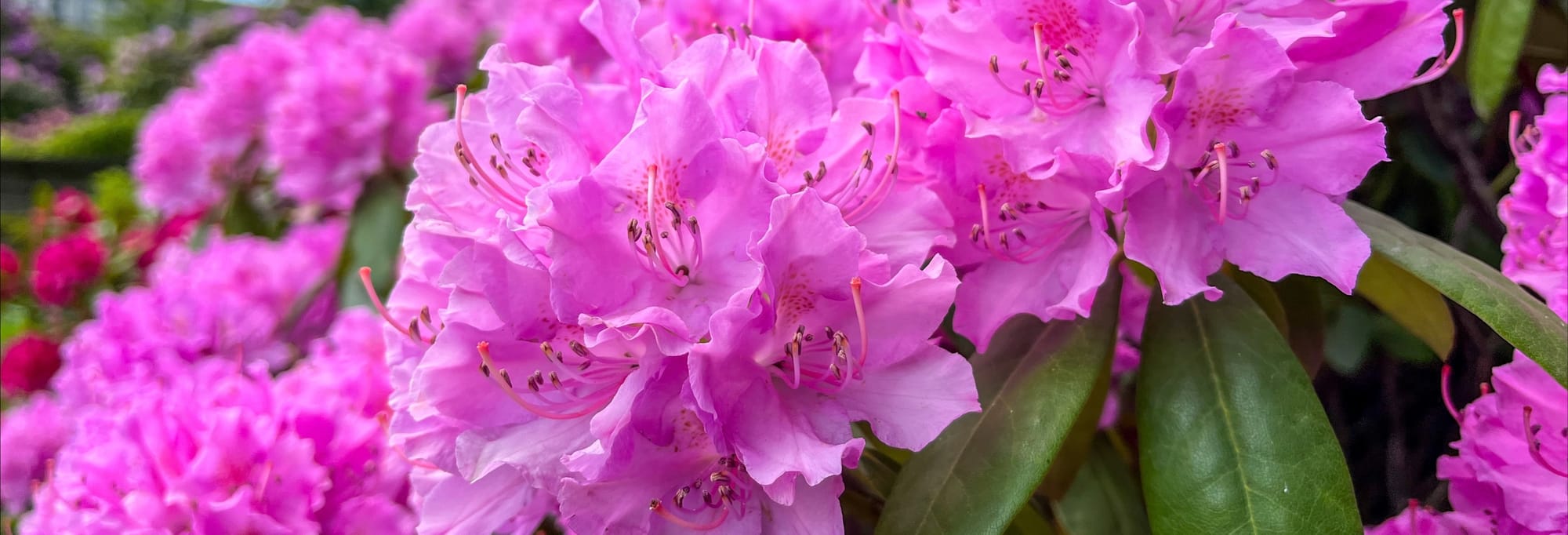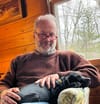June
Huckles has developed a problem: he visits the neighbors.

It is June 1st and I am about finished cleaning up from the effects of winter. Yesterday, I had the Thatcherator out, the name John Deere gives to the rake you can pull behind your lawn tractor. I used it on our driveway to gather back some of the gravel pushed around by the snowplow and grade the ruts left by mud season. John Deere does not say anything about being able to use the Thatcherator on gravel. I was hesitant about doing so when I tried it last year, but it worked like a charm without appearing to damage the tongs. It takes several passes up and down but, when finished, it is hateful to think of driving on it. Like cutting into a newly frosted cake; or a fine lasagna. You just know the first cut is going to subtract from the vision you have of the thing.
We woke up this morning to pouring rain. Corey’s Septic truck arrived soon afterward to administer biennial service. “There goes your driveway,” my wife said.
We have the rhododendrons to fall back on. The blossoms have been bulging for a few weeks and are beginning to pop. I wish I could count them for you. There will be hundreds upon hundreds. Pink and red. Except it may be pink and pinker. I struggle to know the difference between pink, red, and orange. I will say to my wife, “Who’s that woman in the red shirt?”
“You mean, pink shirt.”
We have several substantial rhodies that are many feet tall and wide. “Priceless,” was how our landscape guy referred to them when his crew was reinventing the driveway a couple of years ago. His work may have something to do with the bounty we are seeing this year. There is a little more light coming through, and, following his instructions on feeding the new plantings he put around the house, we have been tossing some food to the rhodies.
I never thought much about rhododendrons when we lived in suburban Boston. They resisted sculpting and were more muscular than their delicate counterparts along the manicured walkways. Those plants craved attention. Like runway models. The rhodies were happier left alone, sort of gangly and awkward. Against our wooded backdrop in New Hampshire, it is a different story. Here, things can be themselves and just grow, which suits the rhododendrons. This year, the forest will delight in their colorful show.
We added a fifth garden bed in the field last weekend using hemlock boards, the organic alternative to pressure-treated, which we all fear can leech nasty, chemical things into the vegetables. To extend their life, we were instructed to burn the inside and bottoms of the boards using a torch. It essentially caramelizes the wood—think, crème brulee—sealing it against bug invaders, and whatever else. It is not indefinite, but maybe we get ten years, versus six or seven, before the wood has to be replaced. The fifth bed will assume responsibility for beans and carrots previously assigned to its neighbor, which is now home to asparagus. Elsewhere, two short rows of lettuce are in, as well as the tomato plants we incubated in the kitchen window, which seemed eager to get outside now that temperatures at night have been (mostly) above fifty. Tomorrow, I will plant potatoes and onions.
Our dog, Huckleberry, was forced to watch the garden project from the porch, which, for a sixteen-month-old puppy who loves nothing more than bounding through tall grass, was like carving a steak under his nose. But Huckles has developed a problem: he visits the neighbors, which takes him off the reservation. Perhaps I have explained that there are no lights we can see after dark unless, during the summer season, our immediate neighbor is on campus. Retrieving him from there is no problem. Retrieving him from anyplace else means getting in a car. Worse, someone else may need to get in a car to bring him back.
Our solution to this problem is to train him to a GPS collar that works substantially the same as the old Invisible Fence set-up that relied on burying a wire around the property. We live on the edge of a pond and Huck is mostly Labrador retriever. Laying wire across the bottom of the pond so Huck can swim is not an option. Building a fence, even down to the shore of the pond, is also not an option for the reason that Huck could swim around it. GPS would seem to fit the bill.
Without distraction, GPS is working fine. But, ha ha ha, everything distracts a puppy—a falling leaf, a buzzing bee, a passing scent. If a squirrel, chipmunk, or weasel of some sort (there was one of those last week), comes within line of sight, Huck is at the stage where he will launch across the GPS boundary regardless of knowing it means turning to stone.
I do not know how this came up but we were on the Rocky Mountain Soda website recently where they are extolling their Hayden Huckleberry Soda. My wife started scrolling. Huck was lying on the floor nearby, dreaming of the chase. I was fidgeting with whatever.
“You have to hear this,” she said. “Whereas just about every other type of fruit and vegetable has taken to domestication without much fuss the wild huckleberry wants nothing to do with being tied down. Researchers have in fact been trying for many years to domesticate the wild huckleberry with little success. Your best chance of copping some is still to find them in the wild.”
And you would try and tell me there is no such thing as pre-destiny after naming him Huckleberry?

